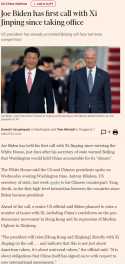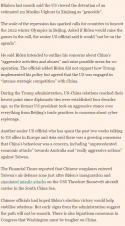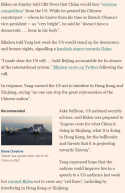Japan has no choice but to cooperate with China. The industrialist know this fact but face resistance from irredentist politician who still dream of Japan greatness and tie themselves to the west instead of making the humbling effort of acknowledging their heinous crime in WW II and make genuine reconciliation along the line of Franco-German reconciliation. The problem is Japan politic smack of feudalism where politician rose from the descendant of old political family and the larger population just acquiesce to the fact. But at least they don't whine about China stealing the technology when they know it is straight bargain market access for technology that is win-win for bot side. It is beneficial to have foreign investment and China is self assured enough to allow it because it become the training ground for both technical, management and sooner or later some manager jump the ship and open their own companies . And the creation of supply chain in China
The strategy comes with its own risks. Ke Ding, a researcher at the Japan External Trade Organization, said that direct investment in China does make it easier for China to catch up to Japanese companies. To avoid import duties and transport costs, "foreign companies try to procure parts locally by training local suppliers in parts production and creating a supply chain in China," he said.
Foreign companies also serve as a training ground for local managers, who may go on to set up their own companies or, later, become recruited by Chinese rivals. But despite all that, Japanese companies are still protective of their presence in China, he said. "Fast-growing China is a more profitable market than mature economies, and more profit means more money for R&D and keeping ahead of the competition," Ke Ding said.
The other reason Japan Inc. invests in China is the presence of a vast and sophisticated supply chain. Complex products like cars require a huge number of components and a large supplier network, which exist in China but not necessarily in up-and-coming competitors like Southeast Asia. In fact, "companies that have moved to Southeast Asia often have to import parts from China due to a lack of local suppliers," Ke Ding said.
As written in the article, all the talks on manufacturing being moved to South East Asia is empty talk. Esp here in Indonesia, we are seeing several Chinese automotive brands like Wuling and DFSK setting up plant/s here, but mostly only for assembly. While they does subcontract some plastic injection parts to locals, most of the metal part and engines are imported in via the sub route of BRI call ChongQing Initiative. And since there is a tax incentive under the CQ framework, it actually helps the chinese firms eat into the marketshare here that was dominated by Toyota. The "move" outside is actually the globalisation of Chinese firms to compete for global marketshare.



